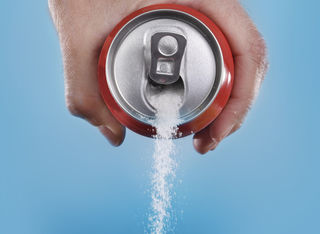Diet
Gary Taubes's New Book Puts Sugar On Trial
...and renders a guilty verdict.
Posted January 25, 2017

It’s no news flash that corporations that make money selling products that turn out to be harmful to our health have not only always opposed government regulation but have supported biased scientific research that creates confusion about the truth or distracts the public from confronting the harm their products are causing. The story is so often the same. “They” knew it caused harm, they covered it up, and they promoted false science in their own defense.
We’re well aware of this pattern when it comes to Phillip Morris and cigarettes. We’re now learning of a similar pattern with Exxon-Mobil which knew about global warming but promoted and supported the research of climate change deniers in order to ward off attempts to regulate fossil fuel extraction and production.
Greed and narrow self-interest have regularly corrupted science. Why should the food industry be any different?
It’s not, and the culprit is sugar—the companies that make and sell it, the ones that produce high-fructose corn syrup (HFCS) and the ones whose products contain it, companies like Nestle, Hershey’s, and General Mills. In fact a huge array of common foodstuffs contain either sugar or HFCS—from pretzels to bread to barbecue sauce to cigarettes (yes, cigarettes). Americans eat approximately 130 lbs of sugar per person per year.
Leading the charge against the ideologies pushed by this powerful industry is science writer, Gary Taubes, whose new book, The Case Against Sugar is the most comprehensive account to date of the politics and science behind sugar, a substance that, according to Taubes, is “the principle cause of the chronic diseases that are most likely to kill us, or at least accelerate our demise, in the 21st century.” Taubes is a passionate partisan. As he, himself, admits in his Forward, “If this were a criminal case, The Case Against Sugar would be the argument for the prosecution.”
Taubes is unusual in the depth and thoroughness of his research on the history of the debates about the potential harm of sugar. He is a historian of science, delving into and mastering scientific debates centuries old. Debates about the health hazards of sugar are simply another example of the ways that science can be and regularly is politicized, pressed into the service of special interests. Science, after all, once “proved” that African-Americans didn’t feel pain as much as whites, that women couldn’t think well with the left sides of their brains, and that intelligence was based primarily in genetics and not social conditions. That we now know better is not only the result of better science but of social movements that challenged traditional prejudices and orthodoxies in all areas of culture, including science.
Taubes’ book should be required reading for anyone alarmed by the fact that at least one in three adult Americans is obese, two thirds are overweight, and one in seven is diabetic. Brick by brick, Taubes carefully guilds his case that sugar consumption is the primary cause of these conditions. And since some of the metabolic dynamics that promote the development of obesity and diabetes are also now linked to gout, cancer, Alzheimer’s, and, especially, heart disease, the conclusion that sugar is the great public health hazard of our times is hard to deny.
Not that the sugar industry—Big Sugar—hasn’t tried hard to deny it. They had to fight off attempts to discourage sugar consumption in the 1940s (war-time rationing) and the 1950s (Eisenhower publicly declared sugar to be dangerous to heart health). Their first gambit—one seen even today--was to counter warnings about the role of sugar in obesity by arguing that sugar was merely “empty calories” and that people got fat because they consumed too many calories or burned too few-- the “Sloth and Gluttony” defense. Overweight people, themselves, were to blame, not the content of their diets. Then, in the 1960s, when Big Sugar’s market share was threatened by diet drinks, sugar companies and their trade groups and PR consultants spent over 4 million in today’s dollars supporting and publicizing bogus research to get the FDA to rule that sugar substitutes like saccharin and cyclamates caused cancer and should be taken off the market. (Cyclamates were “found” to cause bladder cancer in some male rats. Unfortunately, the amounts needed to do so were equivalent to a human drinking 550 cans of Fresca daily!)
And, more recently, Big Sugar has heavily funded and publicized the ill-founded conclusion of some scientists that it is saturated fats, not sugar or carbohydrates, that is the primary culprit behind the growing incidence of obesity and heart disease in America, as well as other societies that have been westernized over time. The argument goes that so-called “diseases of civilization”—hypertension and heart disease especially--are caused by saturated fat, not carbohydrates and sugar. An either/or thinking has been encouraged. If it’s fat, it can’t be sugar and vice-versa.
Taubes reviews the many ways that these scientific controversies were fought in academic journals and conferences, before government agencies and congressional committees, and in slick advertising campaigns. Each challenge to the safety and health of sugar consumption was met with swift counterpunches by Big Sugar. Millions of dollars have been spent coopting university professors and researchers with generous grants and by funding political campaigns opposing contemporary attempts to regulate the size of soft drinks or to tax their profits of their manufacturers (Coca Cola and Pepsi, who else?).
Taubes systematically dismantles the scientific claims of pro-sugar advocates, displaying an impressive understanding of nutrition and biochemistry.
Two examples will suffice: First, the false but seemingly commonsensical claim by the sugar industry that obesity is caused by ingesting more calories than what is spent in physical activity. This axiom that “whatever you eat you have to burn off” misses the crucial point that all calories are not alike. The specific biochemical and physiological effects of the fructose that comprises half of both white sugar and high-fructose corn syrup guarantees fat accumulation and retention by complicated reactions in the liver, pancreas and brain that are specific to fructose. Among these reactions is the stimulation of high levels of insulin in our bodies leading to type-II diabetes, obesity, and hypertension. The insulin triggered by dietary sugars directs fat cells to store fat, increases the production of LDL—the so-called “bad cholesterol--and causes the brain to ignore signals of satiety. Further, as Taubes and others, such as pediatric endocrinologist Robert Luskin at UCSF, point out, it is almost impossible to burn enough calories through exercise to “work off” any significant number of calories and research has shown that exercise is a poor means to lose weight anyway (it’s good for our brains and muscles, but not for significant weight loss). But by blaming people who are fat for their sloth and gluttony, the sugar industry lets itself off the hook. One wonders how the industry might explain away the rise in obesity of 6-month-old babies using this “blame the victim” approach? Lazy? The answer is likely to be found in the sugar content of many brands of baby formula.
Taubes further takes down the sugar industry’s focus on the dangers of saturated fats. He critically examines the Low Fat, High Carb recommendations that exploded on the American diet scene in the early 1980s (think “carbo loading” before strenuous exercise or Nabisco’s low-fat high carbohydrate “Snackwells cookies,”). The leading expert on nutrition in the Post WWII America--and leading proponent of the fats-are-bad-but-sugar-is-harmless paradigm—was University of Minnesota epidemiologist Ancel Keys. His “Seven Countries Study” went a long way to convincing nutritionists and the public that saturated fat, not sugars, caused heart disease. Keys compared heart-disease rates with diet in sixteen populations in Italy, Yugoslavia, Greece, Finland, the Netherlands, Japan and the United States and, sure enough, found a significant correlation between the fat content of the typical diet in these populations and the incidence of cardiovascular disease. Japan and Italy had the lowest rates of heart disease and yet consumed a large amount of complex carbohydrates—starch—in the form of rice and pasta noodles and, thus, Keys and others argued, carbohydrates couldn’t be the problem. The problem, as Taubes points out, is that Japan and Italy also consumed extremely low levels of fructose as well as fat, but Keys neglected to study that particular factor.
There is abundant evidence that fructose is fattening and that diets restricting it have produced the highest average weight loss. But as long as the sugar industry and its scientific and political allies keep shouting “Saturated Fats!,” attention is pulled away from the powerful pathogenic effects of sugars. And that’s no accident. When proof is lacking, the aim is to sow confusion. While the issue of sugar and fat consumption is, indeed, complicated, when sugar advocates shout “its complicated!” they are up to no good.
Fructose is the toxic culprit in Taubes book. The science of its metabolism is certainly complex, and this author is not a nutritionist or biochemist. But it is also not rocket science. Fructose is metabolized in the liver and creates numerous pathways to disease, including obesity, diabetes, and hypertension. In his concluding chapters, Taubes also includes cancer and Alzheimer’s disease as possible long-term outcomes of chronic fructose use. He cites and analyzes multiple studies that show the appearance of these illnesses in cultures that become “westernized”—a process that invariably involves dramatic and sudden increases in sugar consumption.
The chronicity of the diseases and the various long-term effects of what partisans like Taubes or Robert Luskin believe is a poison makes simple cause and effect relationships difficult to establish with 100% validity. What most lay people know is that sugar can be addictive (it appears to activate the same pleasure centers in the brain as cocaine) and it is in almost everything we eat, from sugary drinks, like Coca Cola and Pepsi to infant formula. And, like cigarettes, such products are marketed heavily to young people and in poor communities.
If Taubes likens his book to a legal brief against sugar, it’s hard for readers not return a guilty verdict. He presents enough evidence to persuade his readers that major government funded longitudinal research is needed. But, in the meantime, the documented risks of sugar are great enough and the potential dangers dire enough, to support making sugar a public health issue, much like alcohol and cigarettes. And that means pressuring government to regulate its use.




